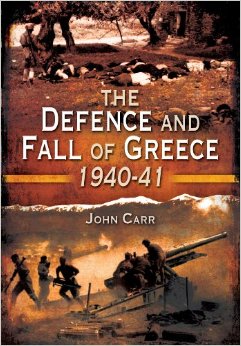We’re not done with January yet and my entirely non-existent book of the year chart already has a candidate in this enjoyable read from John Carr. The book tells the stunning but tragic story of the Greek defence against the naked aggression of the Italians. Things progress very well for the Greeks and they manage to chuck the invaders out of their country into occupied Albania. Unfortunately though, they need support from the British and the growing signs of this can only upset the apple cart. The Germans are in the wings awaiting their moment. We don’t have very long to wait.
While the Italians flounder on land, they are pretty much in control in the air and at sea and the book gives us a solid account of events in those conflicts. The Greek air force was woefully short of decent combat aircraft and was pleased to see the RAF arrive, albeit with Gloster Gladiatiors, Blenheims and a few Wellingtons. But the Italians, though winged, were winning the numbers game and by the time the Luftwaffe appeared it was game over. The heroics of the air war would make a book of their own. Meanwhile at sea the Greek navy laboured with a modest fleet of old ships and submarines. A bad workman always blames his tools and there was nothing bad about the Greek navy. They fought hard and paid a heavy price.
The quality of the German invasion army was on another plain to the Italians. Lacking armour and with the bulk of their army languishing in Albania, the Greeks didn’t have a hope. The undermanned British and Commonwealth units were more or less swept aside and there began the ignominious retreat that would set the stage for the German airborne assault on Crete. My late father in law was there. He was a radio officer on the converted liner Khedive Ismail evacuating troops from the seas around Napflion and Itea to Crete. He used to tell us how the Indian gunners on the ship would blaze away with their Lewis guns as the Stukas flew level with the deck. The Dutch liner Slamat left it late leaving and was sunk with large loss of life, including the crews of two escort destroyers which stopped to pick up survivors.
But all these heroics are really for another story because this book, quite rightly, is about the Greeks and what they did to defend their country.
We see how the army liked to attack, but didn’t like sitting about and really hated retreating. Unfortunately they get to do all three. There is a long look into the Greek psyche and the honest admission that crippling doubt spread like a cancer once the army had finished walloping the Italians. They were always better going forward and once they’d got as far as possible the ideas ran out and things slowly went from bad to worse. As for the politics, it is explained carefully and we see something of the Metaxas regime – fascist in truth (ironic to say the least) and how, despite all her divisions, a fractious country was totally united by the threat of invasion.
Solid straightforward history works for me every time. Perhaps that old rascal Alan Clark would have been more honest if he’d looked in Mussolini’s army for his lions and donkeys instead of the Western Front of WW1. While the incompetence of the Italian top brass is often on a borderline epic scale, make no mistake there was heroism a plenty from the ordinary rank and file right up to a good many battalion commanders. They were betrayed by their leaders because the Muppets calling the shots from Rome were a pantomime show of the worst sort.
The air war aspect is a bit special because there is so much here and one of the great ironies is that Greece was pretty much a client state of Germany and the imagery of Italian Fiat fighters shooting down Henschel recce planes seems skewed, but it happened. We’re also treated to the epic saga of the South African ace Marmaduke Thomas St John Pattle – Pat to his mates. He is thought to be the highest scoring Allied ace of the European war with maybe as many as 52 kills to his credit, but records lost during the evacuation diminish his official total. He was killed over Greece. His isn’t a new story but it is well worth an airing.
Pat and others aside, it is hard to deny the heroism and fortitude of the ordinary Italian soldiers, but this is, fundamentally, a story of Greece and her people. I’m not in marketing, but if I was I would take steps to make this book known to the Greek Diaspora, especially in the Antipodes and North America. If that means you, this book will put a zing in your feelings for the old country as you throw things on the barbie or head out to the hockey rink. There is nothing to beware of Greeks baring the gift of their proud history here.
Review by Mark Barnes for War History Online
THE DEFENCE AND FALL OF GREECE 1940-41
By John Carr
Pen & Sword Military
ISBN: 978 1 78259 181 9
